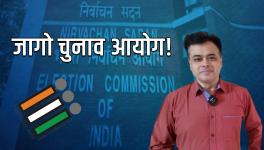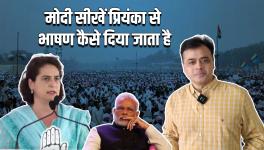BJP Cannot go Solo in Punjab, so why Does it Keep Trying?
Representational Image. Image Courtesy: PTI
After the Shiromani Akali Dal broke its alliance with the Bharatiya Janata Party after the farmers’ movement in 2020-2021, the BJP has been making every possible effort to influence Punjab’s electoral politics. It is trying to do this without substantially changing its strategy and tactics. However, many observers may be baffled as to why the BJP is striving to do this. After all, Punjab’s 13 parliamentary seats cannot decisively influence the outcome of the Lok Sabha elections due in 2024 unless there is a very close contest.
Besides, Punjab is among the few states where the Hindus are in the minority, and the Muslim population has less than a 2% share of the population. Therefore, the BJP’s tried and tested communal rhetoric cannot polarise Punjab’s voters to help it electorally. Remember that even during the Sikh militancy from 1978 to 1992, the incidence of communal violence in Punjab was virtually negligible. Even a successful attempt to polarise the two communities in Punjab could only fetch slightly more than a third of the votes—not enough to come to power.
To think that all Hindu voters will choose the BJP is an illusion. Without the support of Sikh voters, no party can come to power in Punjab. Further, Punjab may not be significant in terms of the arithmetic calculations of the party before the Lok Sabha polls in 2024, but it still carries a great symbolic value. In a way, Punjab is the final frontier for the BJP in north India.
Three strategies the BJP has deployed of late constitute strong signals that it is planning a solo entry in Punjab, and it has tried each of these methods in other states before. Let us begin with how the governor is harassing the incumbent government. Banwarilal Purohit took charge as Governor of Punjab in August 2021. Within a few months, he began to show his approach towards the government when he asked how teachers sent to Singapore for training were selected. The tension that started at that moment has shown no sign of abating.
In February, Purohit did not permit the Budget Session to begin in the Punjab Assembly. The government had to take the matter to the Supreme Court, after which the session was held. Recently, he visited the border areas of Punjab and held a meeting with village sarpanches and advised them to help the security forces. In his press meeting, he indicated that he was maintaining files on the government, indirectly suggesting that he might recommend the dissolution of the Punjab government if need be. What the Punjab Governor is doing is no different from what the governors of other non-BJP-ruled states do, but in Punjab, the confrontation between the governor and the government is sharpening.
The second strategy is the BJP’s recruitment drive among prominent Sikh leaders. Many prominent leaders of the Congress have joined the BJP. The first is the former chief minister of Punjab, Capt Amarinder Singh. He served for four and half years as the chief minister, a phase marked by apathy, corruption and the misuse of power for personal gains. He did nothing to prevent the sharp decline in the quality of administration. Some other prominent leaders, such as Manpreet Singh Badal, Raj Kumar Verka and Sunil Jakhar, have also joined the BJP. A limited exodus has also occurred from the Shiromani Akali Dal. Charanjit Singh Atwal and his son Inder Iqbal Singh Atwal (the BJP candidate in the Jalandhar by-election) are the prominent leaders who have left.
However, the general impression among ordinary people is that most ex-ministers are joining the BJP, hoping that the government’s drive against corruption (read against them) would be stalled. As a matter of fact, the BJP is recruiting Sikhs to ensure the religious factor is neutralised. Of course, this is something to watch as it unfolds over time.
The third strategy is simple but overwhelming. Starting in June, many top central leaders of the BJP started visiting Punjab with the pretext of celebrating nine years of BJP rule. As per the statements of Ashwani Kumar Sharma, the president of the Punjab unit of the BJP, his party will organise functions in all 13 Lok Sabha constituencies for this event. Party chief JP Nadda and Union Home Minister Amit Shah have already visited Punjab. During his visit, Shah dwelled on law and order problems but forgot to mention that in Punjab (up to 50 km from the international border), the central forces are also responsible for preventing many criminal activities. The entry of drones carrying drugs or weapons is frequent in Punjab, and the state police and the Border Security Force (BSF) coordinate their work to prevent such activities. Moreover, what the Indian government is doing in Manipur, a border state, haunts the Centre and Shah.
Shah also reminded the Aam Aadmi Party (AAP) government of its promise to pay Rs 1,000 to women in Punjab, which it has not done yet. And local leaders such as Anil Sarin, Tarun Chugh, and others are also becoming aggressive in their criticism of the AAP government. Their attitude is quite similar to how we see the party’s spokespersons behave at the national level.
It is very clear from all these events that the BJP, in all likelihood, will contest in the 2024 Lok Sabha elections alone in Punjab. But with communal rhetoric (and an imaginary enemy) missing, it is a herculean task for it to dent Punjab politics.
Even if we assume religion as the key criterion that determines BJP’s victories, Punjab’s five districts with a Hindu majority, namely, Pathankot, Jalandhar, Hoshiarpur, Fazilka and Shaheed Bhagat Singh Nagar, are not walkovers for it. Except for Pathankot and Fazilika, caste demography neutralises any possible religious advantage in these regions because their Hindu majority is mainly due to a higher than the state average Scheduled Caste population. This section of the population has not been captivated by the BJP’s rhetoric.
The paradox is simple. The well-off and politically enlightened Dalits are already aligned with their choice of political parties and are critical of the Brahmanical ideology. With the BJP lacking an alliance partner to neutralise the forces rallied against them, its leaders will be left fighting imaginary windmills—literally like Don Quixote.
The author was a professor of sociology at Guru Nanak Dev University, Amritsar, and former president of the Indian Sociological Society. The views are personal.
Get the latest reports & analysis with people's perspective on Protests, movements & deep analytical videos, discussions of the current affairs in your Telegram app. Subscribe to NewsClick's Telegram channel & get Real-Time updates on stories, as they get published on our website.
























